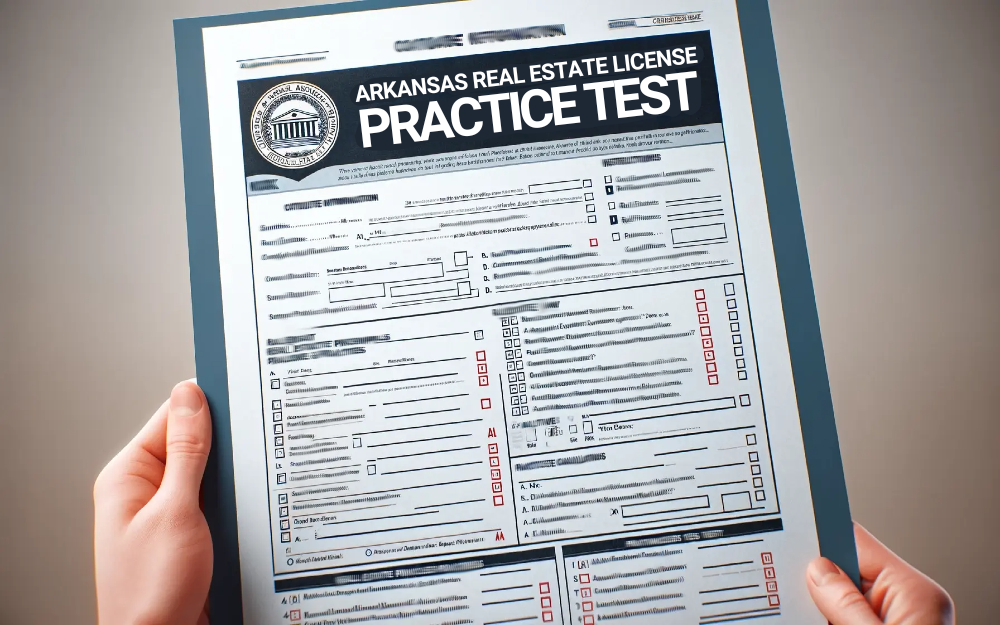
Determine your answer, then click the arrow to see the correct response.
In Arkansas, What Must Be Included in a Real Estate Contract for It To Be Enforceable?
A) A legal description of the property
B) The buyer's employment history
C) The seller's credit score
D) The neighbor's consent
Correct Answer: A) A legal description of the property
Explanation: An enforceable real estate contract must include a legal description of the property being transferred.
A Seller's Agent Knows That the Property Has a Boundary Dispute With a Neighbor but Does Not Disclose This to the Buyer. What Could Happen if the Buyer Finds Out After Closing?
A) The buyer could sue for misrepresentation
B) The transaction would be void
C) The agent could lose their license
D) Both A and C
Correct Answer: D) Both A and C
Explanation: The buyer could sue for misrepresentation, and the agent could face disciplinary action, including losing their license, for failing to disclose material facts.
How Often Must Real Estate Licenses Be Renewed in Arkansas?
A) Every year
B) Every two years
C) Every three years
D) Every four years
Correct Answer: A) Every year
Explanation: Real estate licenses in Arkansas must be renewed annually.
Which of the Following Best Describes a "Tenancy by the Entirety" in Arkansas?
A) Joint ownership by two or more parties
B) Ownership by a single individual
C) Joint ownership by a married couple
D) Ownership by a corporation
Correct Answer: C) Joint ownership by a married couple
Explanation: Tenancy by the entirety is a form of joint ownership available only to married couples, providing survivorship rights and protection from individual creditors.
Which of the Following Actions Requires a Real Estate License in Arkansas?
A) Selling your own home
B) Managing rental properties for multiple owners
C) Assisting a relative in finding a home without compensation
D) Providing legal advice on real estate contracts
Correct Answer: B) Managing rental properties for multiple owners
Explanation: Managing rental properties for others typically requires a real estate license if done for compensation.
A Buyer Discovers That the Property They Purchased Has an Undisclosed Easement That Limits Their Use of the Land. What Recourse Does the Buyer Have?
A) The buyer can request a price adjustment
B) The buyer can rescind the contract
C) The buyer can sue for damages
D) All of the above
Correct Answer: D) All of the above
Explanation: The buyer may have multiple recourse options, including requesting a price adjustment, rescinding the contract, or suing for damages due to nondisclosure.
In Arkansas, How Many Days Does a Tenant Have To Remedy a Lease Violation Before the Landlord Can Proceed Eith Eviction?
A) 3 days
B) 5 days
C) 7 days
D) 10 days
Correct Answer: C) 7 days
Explanation: Arkansas law generally requires landlords to give tenants 7 days to remedy a lease violation before proceeding with eviction.
Which of the Following Is TRUE Regarding Earnest Money Deposits in Arkansas?
A) They must be deposited into a trust account within 48 hours
B) They are held by the seller until closing
C) They must be at least 5% of the purchase price
D) They must be returned to the buyer if the offer is rejected
Correct Answer: D) They must be returned to the buyer if the offer is rejected
Explanation: If an offer is rejected, the earnest money deposit must be returned to the buyer.
What Is the Statutory Redemption Period in Arkansas Following a Foreclosure Sale?
A) 30 days
B) 90 days
C) 180 days
D) There is no statutory redemption period
Correct Answer: D) There is no statutory redemption period
Explanation: Arkansas does not have a statutory redemption period following a foreclosure sale.
Which of the Following Best Describes a "General Warranty Deed" in Arkansas?
A) A deed that provides no warranties
B) A deed that guarantees clear title for the grantor’s ownership period only
C) A deed that guarantees clear title for the entire history of the property
D) A deed that is used for trustee sales
Correct Answer: C) A deed that guarantees clear title for the entire history of the property
Explanation: A general warranty deed provides the broadest form of protection to the grantee, guaranteeing clear title for the entire history of the property.
